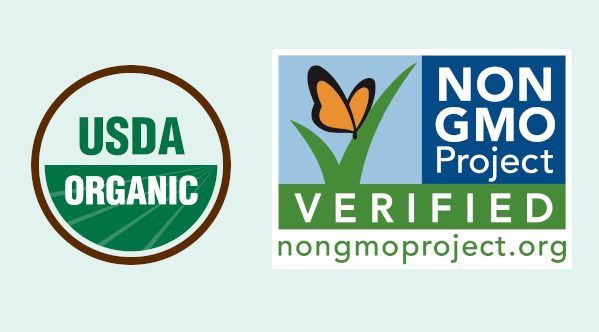A recent survey has found that USDA Organic and Non-GMO Project Verified are by far the most recognizable and most sought after certifications on food products.
Among 15 certification marks that appear on food products, such as organic, Non-GMO Project Verified, fair trade, gluten-free, plant-based, Rain Forest Alliance, and others, 63% of consumers recognize USDA Organic and 54% recognize the Non-GMO Project butterfly logo. The next most recognized certification was gluten-free with 32% recognizing that label and then fair trade at 30% recognition.
“USDA Organic and the Non-GMO Project are head and shoulders above other certifications,” saidHans Eisenbeis, director of marketing and communications at the Non-GMO Project.
Also, 41% of consumers said they were more likely to buy USDA Organic products, while 36% said the same for Non-GMO Project Verified products. Fair trade certified was a distant third with 21% saying they were likely to buy such products.
Changing GMO landscape
The survey of 2,000 individuals in the U.S. (1,400) and Canada (600) was conducted by the Non-GMO Project and Linkage Research.
Part of the impetus for conducting the survey was that the landscape of genetically modified foods is changing with new technologies such as gene editing, and the dialogue around new GMO techniques is increasingly complex.
“300 biotech companies want access to non-GMO and organic markets,” Eisenbeis said.
In fact, some companies that produce gene edited products claim their products are non-GMO. Calyxt labels oil made from its gene edited high oleic soybeans as “non-GMO.”
“They trick people into buying these (gene edited) products,” Eisenbeis said.
The survey aimed to learn who non-GMO consumers are, what they value, and their awareness and preference for non-GMO. The survey also aimed to identify the preferences of younger non-GMO consumers.
“Millennials and zoomers (Generation Z) are entering the market with new behaviors and attitudes,” Eisenbeis said.
The survey found that consumers view non-GMO and organic as big parts of their diet. Survey respondents said that 40% of their diet is non-GMO foods and 31% is organic.
Want foods to be natural, GMOs are unnatural
The survey also looked at consumers’ attitudes toward food, including where it comes from and its impact on the environment and climate change. Ninety-four percent said that the quality of their food is a critical factor in their health and wellness. Seventy-four percent believed that their food choices can help address climate change, environmental health, and biodiversity. As expected non-GMO consumers are concerned about genetically modified foods. Ninety percent agreed that we must be very cautious about altering our food with technology and 84% said they want their foods to be natural and that GMOs are unnatural.
The survey took a close look at non-GMO consumers today and tomorrow. Today’s non-GMO consumers are primarily women (75% versus 25% men), older (42% between the ages of 55 and 74), well-educated, and white Caucasian (80%). Food characteristics that are important to today’s non-GMO consumer include pesticide- and antibiotic-free, non-GMO, organic, and local, among other traits. They want “clean” foods that are processed as little as possible and worry about the long-term impacts of GMOs. Today’s non-GMO consumers are skeptical about the use of science and technology in food.
Meanwhile, tomorrow’s non-GMO consumers are still mostly women (54% versus 46% men), younger (81% are between the ages of 18 and 54), even more educated (38% have college degrees), still primarily white Caucasian (68% with 15% African American and 11% Hispanic). Food characteristics most important to tomorrow’s non-GMO consumer include local, organic, sustainable, regenerative, biodynamic, fair trade, and non-GMO, among others. But tomorrow’s non-GMO consumers are cautious but open to the use of science and technology in food, believing they are essential to figure out how to feed our world’s population. They also believe people have a right to eat GMO foods, and that the use of GMOs in our food is inevitable.
Both groups highly value clean and wholesome foods.
Despite their openness to technology in food, the survey found that tomorrow’s non-GMO consumer seeks out organic and non-GMO foods for themselves and their families and are willing to pay for them.
“The willingness to pay a significant premium (for non-GMO) is high among these consumers,” Eisenbeis said.









